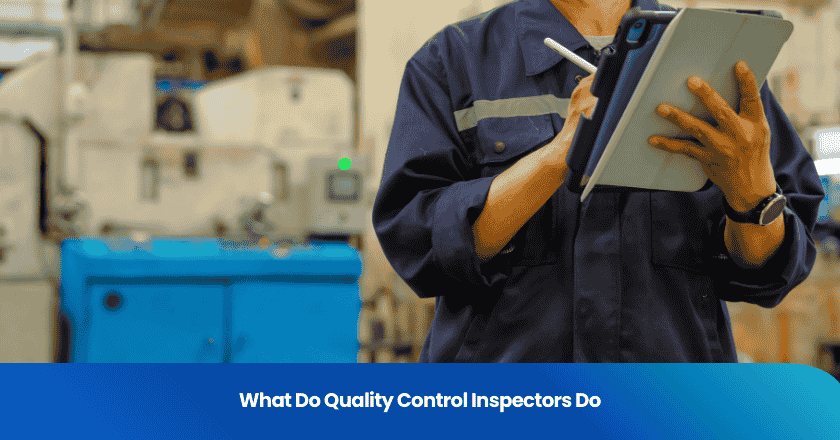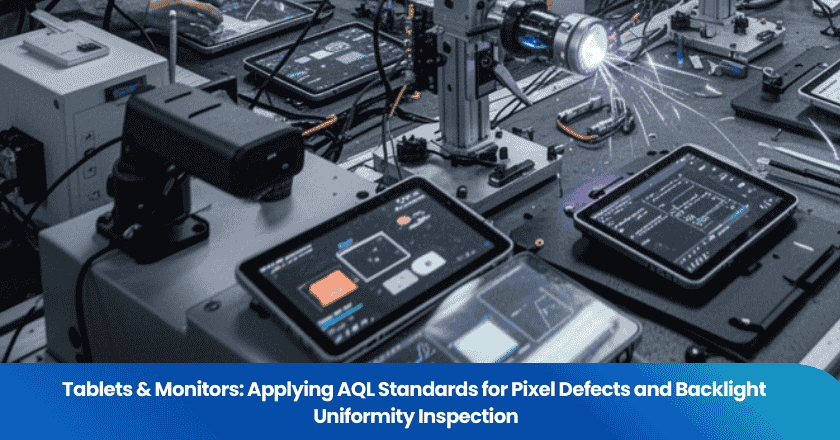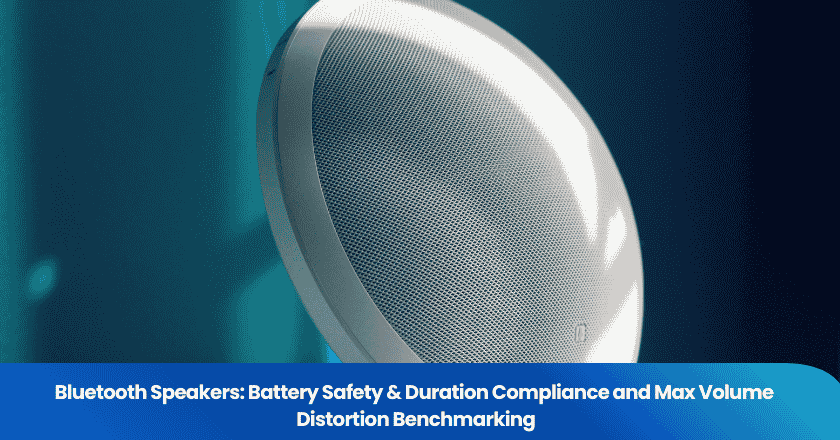
You handle critical responsibilities as a quality control inspector. You ensure products meet strict standards, protect consumer safety, and maintain high levels of quality. When someone asks what do quality control inspectors do, you inspect materials, monitor processes, and verify that every item matches precise specifications. Quality control inspectors remain vital in manufacturing, construction, aerospace, pharmaceuticals, and more. You use your expertise to detect issues quickly and contribute to continuous improvement. The quality control inspector job role goes far beyond basic inspection. You participate in problem-solving and collaborate with teams to uphold quality control at every stage. Inspectors play a central part in quality control, especially in industries like food production, oil and gas, and automotive. Recent labor statistics show that quality control inspectors continue to fill thousands of positions annually, proving that inspectors are essential for complex tasks and upholding standards. Your role as a quality control inspector ensures that quality control remains strong across many sectors.
Key Takeaways
- Quality control inspectors check products carefully to make sure they meet safety and quality standards before reaching customers.
- Inspectors use tools and tests to find defects early, helping prevent costly mistakes and protect the company’s reputation.
- Clear and accurate documentation of inspections is essential to support quality control and meet legal requirements.
- Strong attention to detail, technical knowledge, and good communication skills help inspectors succeed and improve product quality.
- Quality control inspectors work in many industries and can advance their careers by gaining certifications and learning new technologies.
Quality control inspector responsibilities
As a quality control inspector, you play a central role in maintaining product standards and ensuring safety. Your daily work involves a series of critical tasks that keep the quality control inspection process effective and reliable. Let’s break down the main quality control inspector responsibilities into three core areas.
Inspection tasks
You begin your day by preparing for inspection and testing at various stages of production. You check incoming materials, monitor in-process items, and conduct final inspection before products leave the facility. Your responsibilities include:
- Inspecting products visually to spot surface flaws, color inconsistencies, or assembly errors.
- Using precise measurement tools like calipers and micrometers to verify dimensions and tolerances.
- Performing functional testing to ensure products operate as intended.
- Conducting destructive testing when necessary to evaluate durability and safety.
- Monitoring production lines to catch issues early and prevent defective products from advancing.
- Accepting or rejecting finished items based on established quality standards.
- Reporting test and inspection data to supervisors and production teams.
You rely on both manual and automated tools to complete these tasks. Modern technology, such as real-time data analytics and mobile inspection software, allows you to collect and analyze information quickly. Automated proofreading and machine vision systems help you reduce manual errors and speed up reporting. By using these advanced tools, you can focus more on strategic activities and continuous improvement.
Tip: Consistent monitoring and thorough inspection at every stage help you identify problems before they escalate, saving time and resources.
Identifying non-conformance
Defect identification is a core part of your job. You must spot deviations from specifications and act quickly to address them. The process for identifying non-conformance includes several steps:
1. Inspection and testing of products or processes to detect deviations from standards.
2. Use of statistical process control tools, such as control charts, to monitor process stability.
3. Performing quality control checks at different production stages, including receiving, in-process, and final inspection.
4. Gathering and analyzing customer feedback to detect hidden issues.
5. Conducting root cause analysis to understand why a defect occurred.
6. Documenting non-conformance details, including the type of defect, severity, and responsible personnel.
7. Segregating nonconforming products to prevent their use or shipment.
8. Disposing of defective items according to regulatory guidelines, which may involve scrapping or returning them to suppliers.
You must remain vigilant during every inspection. In industries like aerospace and pharmaceuticals, you often work with extremely low defect rates—sometimes near zero for critical defects. The following table shows typical acceptable defect rates across different industries:
| Industry / Defect Type | Typical AQL (%) | Notes and Examples |
|---|---|---|
| Aerospace & Medical (Critical) | Near 0.0 - 0.1 | Zero tolerance for critical defects due to safety concerns |
| Consumer Electronics (Major) | 0.65 - 2.5 | Functional defects like non-working buttons, touchscreen issues |
| Textiles & Apparel (Minor) | 2.5 - 4.0 | Cosmetic defects such as color variations, packaging imperfections |
You must understand that defect identification and monitoring are not just about finding problems—they are about preventing them from recurring. By collaborating with production teams, you help implement corrective actions and improve overall quality control.
Documentation
Accurate documentation is essential for every quality control inspector. You must record every inspection, test, and defect identification clearly and systematically. Your documentation methods include:
- Completing inspection checklists to ensure all points are covered.
- Recording inspection details such as report ID, date, time, location, and your name.
- Logging product or process information, including batch or lot numbers.
- Detailing findings and observations, noting both compliance and deviations.
- Including non-conformance details, such as descriptions and severity of defects.
- Attaching visual evidence like photographs or diagrams to support your findings.
- Recommending corrective or preventive actions when necessary.
- Collecting signatures and approvals from supervisors to validate reports.
You often use digital platforms to streamline data entry, storage, and sharing. Automated inspection devices can record measurements directly into computer systems, reducing manual errors and supporting real-time analysis. Regulatory requirements demand that you maintain thorough, accurate, and current documentation. You must organize records logically, use standardized templates, and ensure easy access for audits or reviews.
Note: Proper documentation not only supports compliance but also protects your company from legal risks. Inadequate records can lead to fines, lawsuits, or even loss of operating licenses.
Your commitment to detailed documentation and rigorous inspection ensures that the quality control inspection process remains robust. By maintaining high standards, you help your organization avoid costly mistakes and uphold its reputation for quality.
Skills and qualifications
As a quality control inspector, you must meet strict quality control inspector requirements to succeed in your role. Your skills and qualifications directly impact your ability to maintain high standards and ensure product safety.
Attention to detail
You need exceptional attention to detail to excel as a quality control inspector. Every day, you examine products and materials with a sharp eye, searching for even the smallest defects or deviations from specifications. This skill requires you to focus on intricate details for extended periods, use measurement tools with precision, and document your findings thoroughly. Employers often assess your attention to detail through practical simulations and targeted skills assessments. These evaluations test your ability to identify quality issues, solve problems, and make sound decisions in real-world scenarios. During interviews, you may encounter questions about past experiences where you identified overlooked defects or managed quality under pressure. Your meticulous approach helps prevent defective products from reaching consumers, which protects both safety and reputation.
Technical knowledge
Technical knowledge forms the backbone of your effectiveness as a quality control inspector. You must understand inspection techniques, testing procedures, and the significance of different types of defects. Many industries require you to complete relevant training or certification programs, such as Six Sigma, Certified Quality Engineer, or ISO 9001 lead auditor training. These certifications demonstrate your commitment to meeting quality control inspector requirements and improving your technical proficiency. On-the-job training gives you hands-on experience with inspection equipment, technical drawings, and process improvement methods. Your technical skills enable you to monitor production, detect abnormalities in real time, and maintain compliance with industry standards. Regular training and staying updated on new equipment and regulations help you reduce errors and improve overall quality control.
Key technical skills include:
- Defect identification and root cause analysis
- Operation of testing equipment and measurement tools
- Understanding technical drawings and specifications
- Process improvement and continuous monitoring
- Adherence to safety regulations
Communication
Strong communication skills are essential for every quality control inspector. You must report non-conformance clearly and efficiently to production teams, management, and other departments. Formal systems, such as non-conformance reporting software and quality management platforms, help you document and escalate issues. You need to ensure that everyone involved understands the problem and the required corrective actions. Training your team to report issues without fear and maintaining clear standard operating procedures support consistent communication. Miscommunication between departments can lead to mistakes and non-conforming products, so you must foster open feedback loops and thorough documentation. By communicating effectively, you help bridge gaps between design, production, and quality control, ensuring that everyone works toward the same high standards.
Work environments for quality control inspectors
Quality control inspectors work in a variety of environments, each with unique demands and challenges. Your role adapts based on the industry, but your focus on quality control remains constant. You may find yourself on a busy factory floor, inside a food processing plant, or at a construction site. Each setting shapes your daily tasks and the skills you need to succeed.
Manufacturing
In manufacturing, you often work onsite, surrounded by machinery and production lines. As a cnc quality control inspector, you check incoming materials, monitor in-process products, and verify finished goods. You use precision tools to measure components and ensure they meet strict specifications. Fast-paced environments require you to manage multiple tasks, collaborate with production teams, and maintain detailed documentation. You handle rejected materials, participate in review boards, and contribute to process improvements. Your attention to detail and problem-solving skills are essential for identifying defects and resolving quality issues. Manufacturing also employs cnc quality control inspectors who specialize in monitoring computer numerical control (CNC) machines, ensuring every part meets exact standards. You play a key role in maintaining quality control throughout the production process.
Food and beverage
In the food and beverage industry, you focus on safety and compliance. You inspect raw ingredients, monitor processing steps, and verify packaging integrity. Quality control in this environment means checking for contamination, ensuring proper labeling, and maintaining hygiene standards. You document every inspection and collaborate with teams to address non-conformances quickly. Your work helps prevent recalls and protects public health. You may also use specialized equipment to test for allergens or contaminants. The fast pace and strict regulations demand that you stay alert and organized. Quality control inspectors in this sector often work closely with regulatory agencies to ensure compliance with food safety laws.
Construction
On construction sites, your quality control duties involve inspecting materials, monitoring installations, and ensuring compliance with building codes. You face unique challenges such as incomplete design documents, coordination conflicts, and changing site conditions. As a quality control inspector, you must adapt to weather, manage multiple trades, and resolve communication breakdowns. You document inspections, report non-conformances, and supervise on-site work. The construction environment requires you to bridge gaps between different teams and maintain consistent records. You may also use mobile inspection apps and digital tools to streamline your work. In some projects, you oversee the installation of pharmaceutical facilities, where quality control standards are especially strict. Your expertise ensures that every phase of construction meets regulatory and safety requirements.
Note: In pharmaceutical manufacturing and construction, you must follow rigorous quality control procedures to meet industry regulations and protect consumer safety.
Career outlook for quality control inspectors
Job growth
You see rapid changes in the demand for quality control inspectors across industries. Automation, artificial intelligence, and digital traceability tools reshape the landscape. Companies now require you to manage advanced quality control systems, analyze real-time data, and oversee automated inspection processes. You face scalability issues as manual inspection struggles to keep pace with production growth. Human error and inefficiency drive organizations to invest in technology, shifting your role toward strategic oversight. Regulatory requirements and consumer demand for transparency also increase the need for skilled quality control professionals who understand compliance and sustainability. You must adapt to new tools and processes, making technological proficiency essential for career longevity.
- Scalability challenges in manual inspection
- Increased need for data analysis and reporting
- Adoption of AI and predictive analytics
- Emphasis on sustainability and traceability
- Evolving regulatory requirements
Advancement
You have several paths for career advancement in quality control. Large organizations offer opportunities to move into management, specialize in niche sectors, or transition into consulting and teaching roles. You may become a quality control manager, lead teams, and set inspection standards. Specializing in areas like electric vehicles or organic food products enhances your expertise and job security. You can also shift into quality assurance, focusing on defect prevention and process improvement. Earning certifications such as Certified Quality Inspector (CQI), Six Sigma, or ISO 9001 Internal Auditor boosts your qualifications and prepares you for supervisory roles. Professional organizations provide networking and ongoing education, supporting your growth.
| Certification/Training | Issuing Organization | Relevance to Supervisory Advancement |
|---|---|---|
| Certified Quality Inspector (CQI) | American Society for Quality (ASQ) | Demonstrates competence, improves promotion prospects |
| Six Sigma Green Belt or Black Belt | Various (ASQ, IASSC, etc.) | Valuable for leadership roles in quality management |
| ISO 9001 Internal Auditor | ISO / Accredited bodies | Enhances auditing and supervisory skills |
| Industry-specific certifications | Varies | Supports career growth and responsibilities |
| Online Quality Control Courses | Various online platforms | Keeps skills updated for supervisory duties |
Salary
You benefit from competitive salaries and comprehensive compensation packages in quality control. The median annual base salary for quality control inspectors in the United States is $67,249, with total compensation reaching $90,485 when including benefits. Salaries vary by industry and location. Biotechnology offers higher pay, with median salaries ranging from $82,815 to $128,509. Inspectors in San Francisco and California earn above-average wages. Pipeline sectors provide additional benefits such as overtime, travel allowances, and safety bonuses. Union membership and advanced certifications can increase your earnings by 15-20% or more. Larger employers offer better benefits, including health insurance, retirement plans, and paid time off.
| Category | Salary (USD) |
|---|---|
| Median Annual Base Salary | $67,249 |
| Total Compensation (with benefits) | $90,485 |
| Salary Range (10th to 90th percentile) | $52,332 - $81,348 |
| Median Salary in Biotechnology Industry | $82,815 - $128,509 |
| Median Salary in San Francisco | $83,987 |
| Median Salary in California | $74,176 |
You play a vital role in quality control, ensuring product safety and building consumer trust. Your daily work includes:
- Conducting regular sampling and testing at every stage of production.
- Developing and following Standard Operating Procedures.
- Maintaining detailed records and collaborating with teams to resolve issues.
- Identifying defects early, which prevents costly recalls and protects your company’s reputation.
If you want to advance in quality control, consider these recognized certifications:
| Certification | Focus Area | Format |
|---|---|---|
| CQI | Quality control principles | Online/In-person |
| CCI | Construction inspection | Online/In-person |
Attention to detail and a commitment to quality control standards set you apart in this essential career.
FAQ
What qualifications do you need to become a quality control inspector?
You usually need a high school diploma or equivalent. Some employers require additional training or certifications. You must understand the quality control inspection process, inspection and testing methods, and quality control inspector requirements for your industry.
What does a typical day look like for quality control inspectors?
You start by reviewing inspection schedules. You perform inspection and testing on materials and products. You monitor production, document findings, and report test and inspection data. You accept or reject finished items based on standards.
How do quality control inspectors identify defects?
You use visual checks, measurement tools, and testing equipment. You compare results to specifications. Defect identification involves monitoring for non-conformance and documenting any issues. You may conduct root cause analysis to prevent future defects.
What industries employ quality control inspectors?
You find quality control inspector job roles in manufacturing, food and beverage, construction, and pharmaceutical sectors. Inspectors also work in automotive, aerospace, and as cnc quality control inspectors in specialized fields.
Why is documentation important in the quality control inspection process?
You must document every inspection, test, and final inspection. Accurate records support compliance, help with defect identification, and ensure corrective actions. Documentation protects your company and maintains high quality control standards.
Grow your business with TradeAider Service
Click the button below to directly enter the TradeAider Service System. The simple steps from booking and payment to receiving reports are easy to operate.





